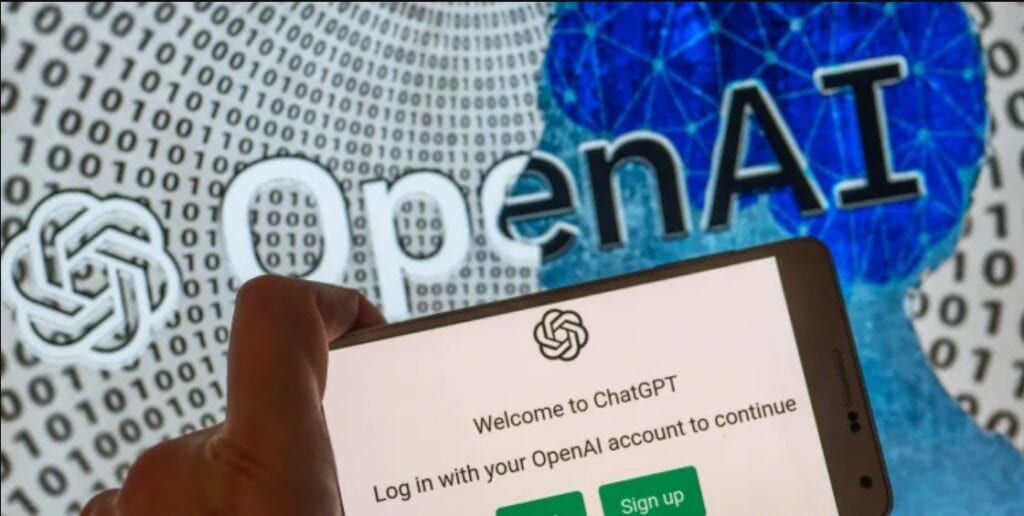So, here’s the scoop: OpenAI has made some changes to how you access ChatGPT. In the past, you had to sign in every time you wanted to chat. But guess what? Now, you can just hop on over to the ChatGPT website and start chatting right away, no sign-in required! How cool is that?
(NordVPN 1 year deal with 58% off for $5.00/mo)
OpenAI’s rolling out this change globally, but it might take a bit for everyone to see it. They’ve also beefed up their safety measures to make sure things stay on the up and up. That means blocking prompts in a wider range of categories to keep things squeaky clean.
- How to access ChatGPT in China with 3 simple steps?
- How to register an OpenAI account in China?
- Best VPN for unblocking ChatGPT in China
- How to Fix the Error “ChatGPT is at capacity right now”?
- Download OpenAI ChatGPT app
- What is ChatGPT
- What is GPT-4
- About OpenAI
- Why OpenAI service is not available in China?
- ChatGPT Lookalikes Proliferate in China
- The Reddit discussions center around the topic of ChatGPT in China
- FAQ: About ChatGPT
- What are the supported countries and territories for OpenAI?
How to access ChatGPT in China with 3 simple steps?
To access ChatGPT in China, here are the steps
- Step 2: Use a VPN to fix the “OpenAI’s services are not available in your country” issue.
- Step 3: Enjoy the ChatGPT!
Just to clarify, access to ChatGPT 3.5 is available without an OpenAI account, but you will need an account to unlock full access to ChatGPT 4. Here’s your guide to gaining access:
- After logging in, look for the “Upgrade to Plus” option in the bottom left corner of the screen and click on it.
(NordVPN 1 year deal with 58% off for $5.00/mo)
How to register an OpenAI account in China?
But hey, if you do have an OpenAI account, you still get some perks. You can save and review your chat history and even set up custom instructions. Want in on the action? You can create an OpenAI account using your email or through your Apple, Microsoft, or Google account. Easy peasy!
To register an OpenAI in China, users can simply navigate to https://chat.openai.com/ to register an OpenAI account and then log in using their email address and password. After that, you will be able to upgrade to ChatGPT 4.
However, I’m sure you must be pretty frustrated to see the page showing “OpenAI’s services are not available in your country“. Don’t worry, there is a way to make you able to sign up for an OpenAI account for ChatGPT in China or Hong Kong, so let’s talk about how to register it!
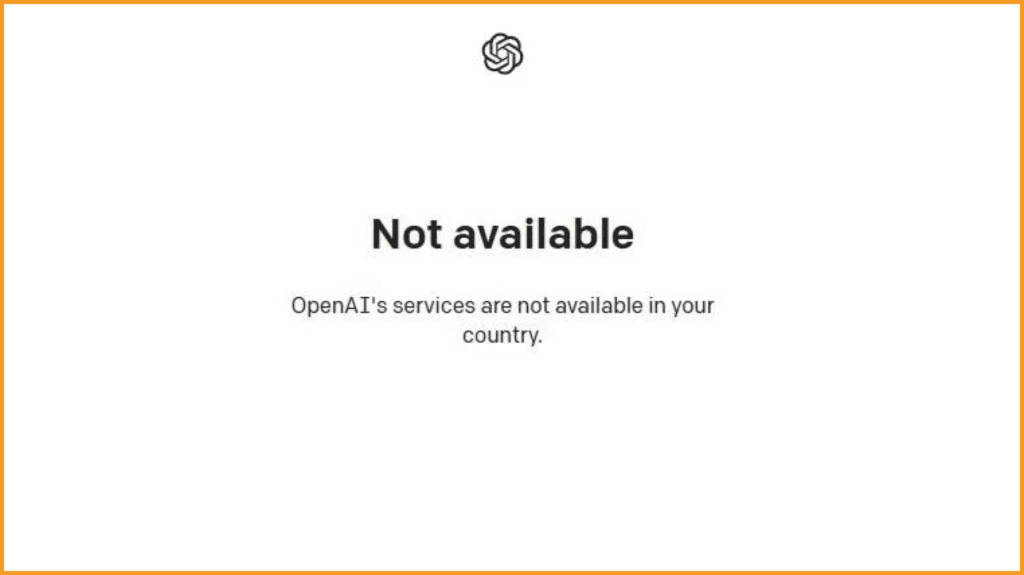
1. Use a VPN to change your IP address from China to other countries where OpenAI’s services are available, such as the United States, United Kingdom, etc.
2. Change your time zone to Pacific Time (US & Canada). Actually, I think any country’s time zone where OpenAI’s services are available should be fine. I’m using Pacific Time.

3. Use the Incognito mode to open the OpenAI website and start the registration process. Now you should be able to see the “Verify your phone number” step.

4. Since China’s domestic mobile phone number cannot be used for a ChatGPT account, now you need an SMS-activate tool to get a virtual phone number for receiving the security code. I’m using the https://sms-activate.org/en/ one, which I think it’s working fine for me.
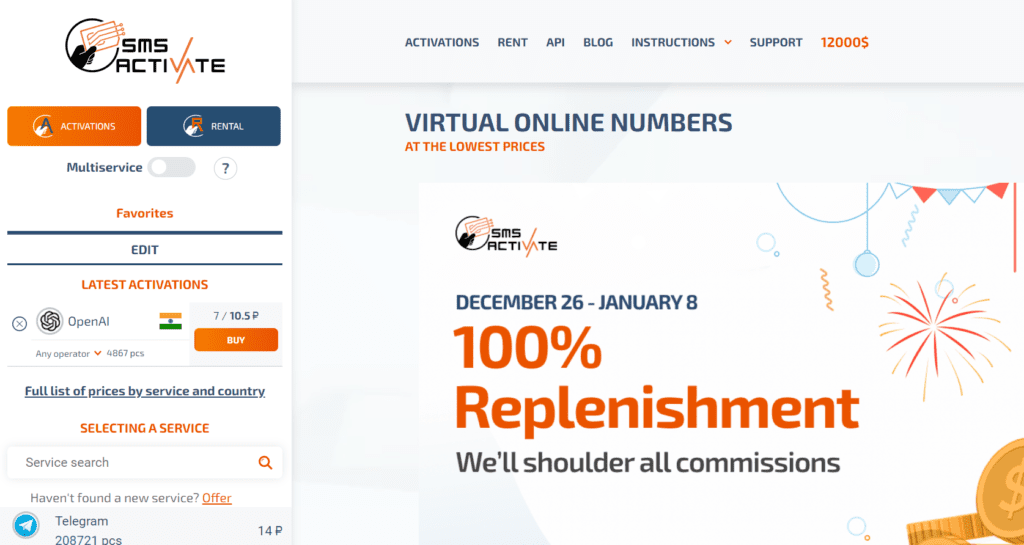
Here you need to register an account on the sms-activate platform, just register with your email.
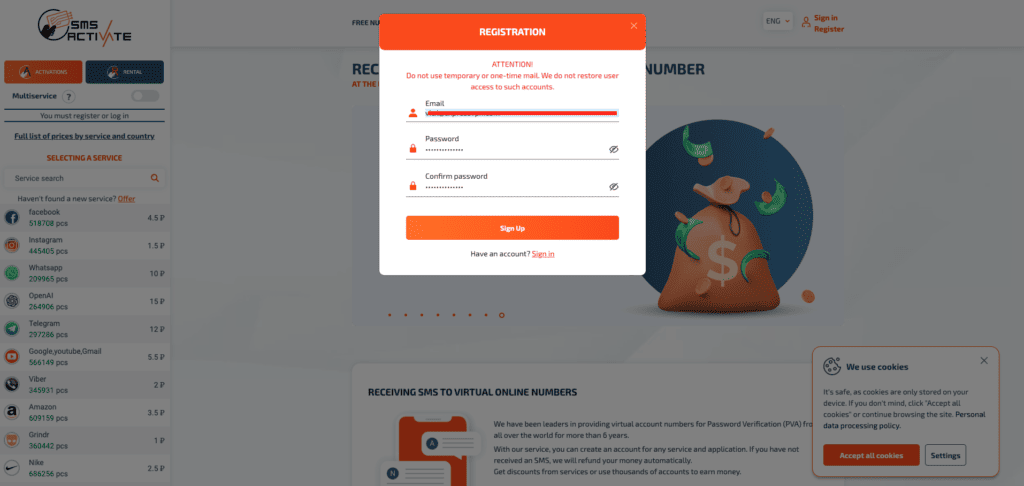
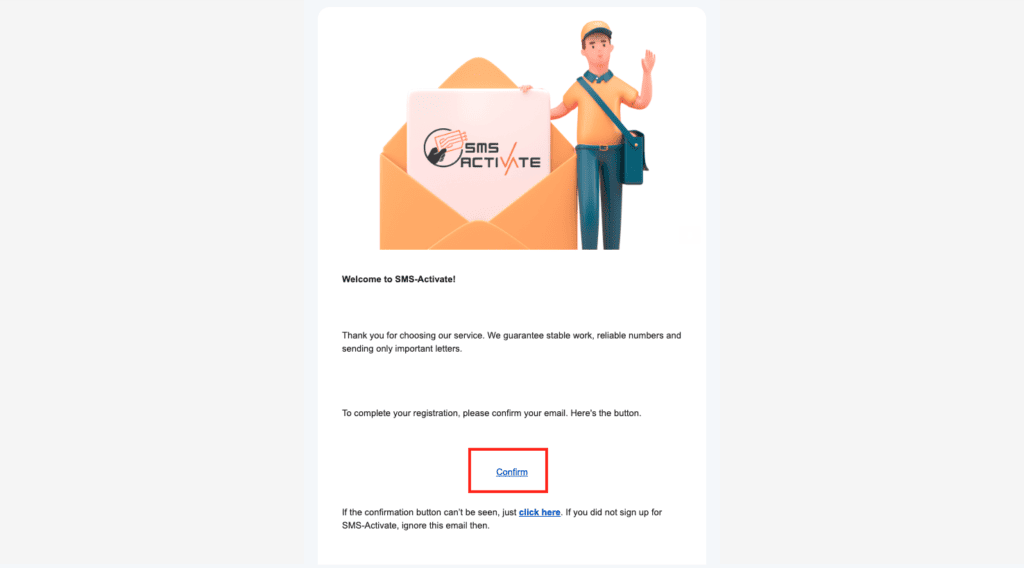
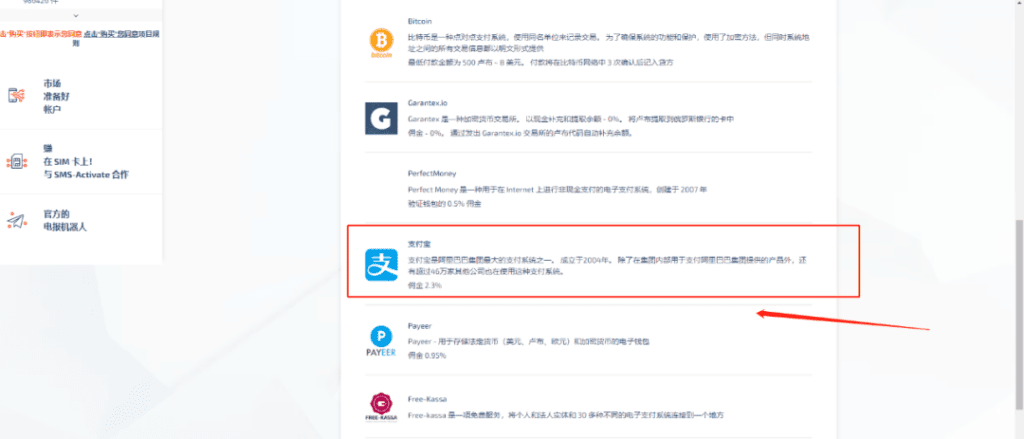
After registration, complete verification by email. The next step is to top up. After recharging, go back to the homepage and search for the keyword “open” to find the temporary number purchase link of the OpenAI verification code.


Then, you can see the temporary number to be used in the activation area, and copy this number into the verification code receiving area of OpenAI. Click Send Verification Code, so that you can receive the verification code on the code-receiving platform (sometimes it is a little slow and you need to wait patiently), fill in the verification code, and the registration is completed.
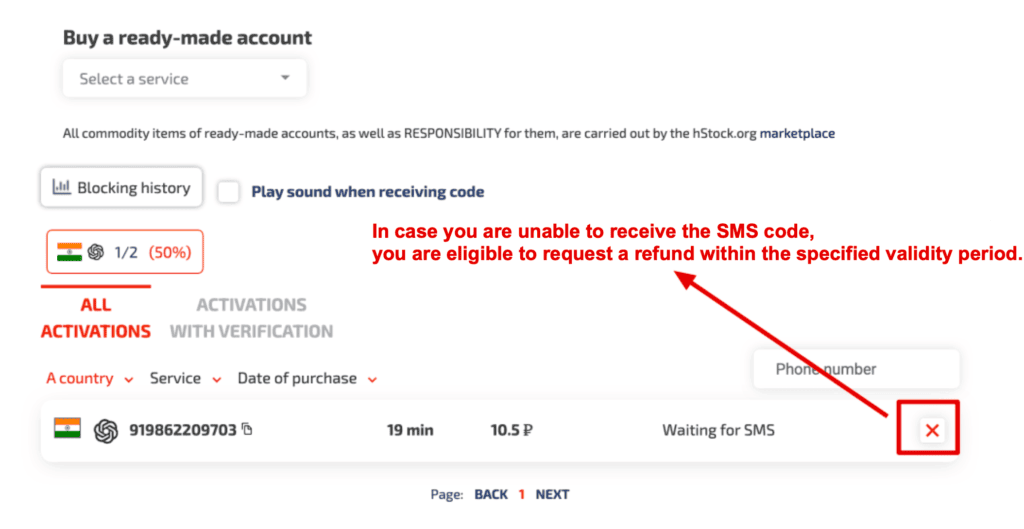
5. After you’ve verified your phone number, you should be able to access the ChatGPT finely!
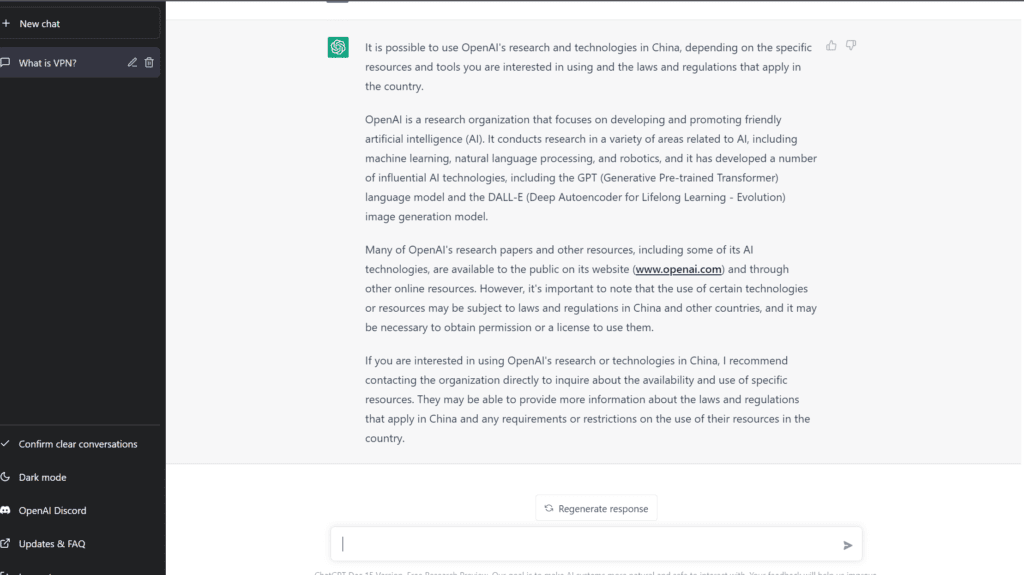
Best VPN for unblocking ChatGPT in China
(NordVPN 1 year deal with 58% off for $5.00/mo)
I’m recommending NordVPN for anyone in China looking for a fast, secure, and reliable VPN. With a solid overall score of 8.8/10, NordVPN makes sure your internet experience is smooth even with online restrictions.
NordVPN’s performance is impressive, you can stream, work, and browse with little to no slowdowns. Using advanced protocols like NordLynx (based on WireGuard), NordVPN keeps your connection fast and secure.
What sets NordVPN apart is its huge network of over 7,200 servers in 118 countries. This makes it easy to unblock websites and streaming services, which is especially important for users in China who need to bypass restrictions.
The best part? NordVPN offers affordable pricing, starting at just $4 per month (or $60 for the first year). Plus, with a 30-day money-back guarantee, you can try it risk-free.
(NordVPN 1 year deal with 58% off for $5.00/mo)
Here’s a quick look at why NordVPN is a great choice:
| Key Statistic | Value |
|---|---|
| Overall Score | 8.8/10 |
| Introductory Pricing | $4 per month / $60 for the first year |
| Average Speed Loss | Only 3% drop in download speeds (2025 tests) |
| Global Servers | 7,200+ servers |
| Countries Covered | 118 countries |
| Jurisdiction | Panama |
| Advanced Protocols | NordLynx (WireGuard), OpenVPN, NordWhisper |
| Money-Back Guarantee | 30 days |
If you want a fast and private VPN with easy access to global content, NordVPN is a great choice. Start using it today for a better, safer online experience and don’t miss NordVPN 1 year deal with 58% off for $5.00/mo!
How to Fix the Error “ChatGPT is at capacity right now”?
According to my personal experience, the best solution for fixing the “ChatGPT is at capacity“ error is to alter your IP address to a nation with lower usage. You can make a rough estimate based on factors such as time zone and the size of the country first and then check the specific information available regarding the ChatGPT capacity for countries globally through the site https://status.openai.com/.
One simple method to alter an IP address, which is also a way that I have been using, is by utilizing a Virtual Private Network (VPN). The VPN creates a secure tunnel for transmitting and receiving data, bypassing the conventional path for internet traffic which goes directly to your ISP.
Download OpenAI ChatGPT app
OpenAI is making it even simpler for folks to get their hands on ChatGPT. OpenAI recently announced the release of a free ChatGPT app exclusively for iOS users in the United States. And hold on tight because it won’t be long before it expands to other countries.
This exciting launch comes just six months after OpenAI introduced ChatGPT to the public online. Since then, it’s triggered a frenzy in the tech industry, with companies scrambling to develop and deploy their own tools capable of generating impressive written work and images based on user prompts.
If you find yourself in China not being able to get the OpenAI ChatGPT app everybody’s talking about it. Here might be the way to fix it.
(NordVPN 1 year deal with 58% off for $5.00/mo)
What is ChatGPT
ChatGPT is a Language Model for Optimizing Conversation.
GPT, or Generative Pre-trained Transformer, is a type of language model developed by OpenAI. It is a neural network-based machine learning model that is trained on a large dataset of text and is able to generate human-like text by predicting the next word in a sequence based on the context of the words that come before it.
GPT models are called “generative” because they can generate new text that is similar to the text they were trained on, and they are “pre-trained” because they are trained on a large dataset before being fine-tuned for a specific task. They are also called “transformers” because they use a type of neural network architecture known as a transformer to process the input data.
GPT models are commonly used for a variety of natural languages processing tasks, such as language translation, text summarization, and language generation. They are also used in chatbots and other applications where the ability to generate human-like text is useful.
What is GPT-4
OpenAI has created a new language model, GPT-4, that can generate text that closely resembles human speech, representing an advancement over the technology currently utilized by ChatGPT, which is based on GPT-3.5. Generative Pre-trained Transformer (GPT) is an AI deep learning technology that employs artificial neural networks to mimic human writing.
OpenAI asserts that GPT-4 excels in three critical areas: creativity, visual input, and longer context. In terms of creativity, GPT-4 surpasses its predecessor by being superior at creating and collaborating with users on creative projects, such as music, screenplays, technical writing, and even learning a user’s writing style. Additionally, GPT-4 can now process up to 25,000 words of text from the user and interact with text from web pages. This capability can be beneficial for producing long-form content and extended conversations.
Moreover, GPT-4 can receive images as a basis for interaction, such as identifying what can be made from a few baking ingredients. It remains unclear if videos can be employed in the same way. Finally, OpenAI emphasizes that GPT-4 is significantly safer to use than its predecessor, as it can produce 40% more factual responses in OpenAI’s internal testing and is 82% less likely to respond to requests for disallowed content. These advancements were made possible through collaboration with over 50 experts across various domains, including AI safety and security.
(Related article: How to use GPT-4 on ChatGPT?)
(NordVPN 1 year deal with 58% off for $5.00/mo)
About OpenAI
OpenAI is a research organization that focuses on developing and promoting friendly artificial intelligence (AI). It was founded in 2015 by a group of entrepreneurs and researchers, including Elon Musk and Sam Altman, with the goal of advancing AI in a way that benefits humanity.
OpenAI conducts research in a variety of areas related to AI, including machine learning, natural language processing, and robotics. It has developed a number of influential AI technologies, including the GPT (Generative Pre-trained Transformer) language model and the DALL-E (Deep Autoencoder for Lifelong Learning – Evolution) image generation model.
In addition to conducting research, OpenAI also works to promote the responsible development and use of AI, through initiatives such as its Center for Human-Compatible Artificial Intelligence and its Ethics and Society research program.
Why OpenAI service is not available in China?
Due to the strict control, the Chinese government exerts over the internet through a censorship system known as the “Great Firewall,” it is conceivable that access to the OpenAI Chat website may be restricted in China.
The government censors websites and services it deems inappropriate or harmful, which may encompass sites providing political or social commentary or those that offer anonymous communication tools or circumvention of internet censorship. There is also the chance that the OpenAI Chat website may not be available in China due to other reasons, such as technical problems or network disruptions.
ChatGPT Lookalikes Proliferate in China
Despite not being officially available in China, ChatGPT has gained significant popularity in the country. Chinese search engine Baidu is set to launch its own competitor called Ernie Bot in March (ChatGPT Chinese version), which has stirred up excitement in the Chinese tech industry. Other major players such as Alibaba, NetEase, and Tencent have also promised similar initiatives, causing a surge in Chinese tech stocks. The government in Beijing has pledged to provide more support for these efforts.
For the first time in over a decade, Chinese internet companies are racing to adopt, localize, and potentially enhance a Silicon Valley invention that rivals Google, Facebook, and YouTube. While Microsoft’s Bing and Alphabet’s Google have a head start, their AI search assistants, including Google’s Bard, have several flaws that could create problems if rolled out too soon. Attempting to launch these services in China could be even more challenging due to the country’s complex censorship policies. Managing an adaptable AI bot in this environment would present a new set of challenges.
(NordVPN 1 year deal with 58% off for $5.00/mo)
The Reddit discussions center around the topic of ChatGPT in China
The Reddit discussions revolve around accessing ChatGPT in China, with users sharing information about building ChatGPT solutions that are free to use and do not require a VPN or phone number for registration. Some users discuss using VPNs like Astrill and Veee VPN to access ChatGPT, while others inquire about using Outline VPN.
There are also feedback requests and discussions about the availability and challenges of using ChatGPT in different regions of China, including Shanghai, Shenzhen, and Hong Kong. Users exchange information about their experiences and seek assistance in accessing ChatGPT while in China.
FAQ: About ChatGPT
ChatGPT is free, for now. But OpenAI’s CEO Sam Altman has warned that the gravy train will eventually come to a screeching halt: “We will have to monetize it somehow at some point; the compute costs are eye-watering,” he tweeted. The company, which expects to make $200 million in 2023, is not a charity.
OpenAI allows for commercial use of the Generations here: “Use of Images. Subject to your compliance with these terms and our Content Policy, you may use Generations for any legal purpose, including for commercial use.
No, ChatGPT is not available in Hong Kong because OpenAI does not allow users based in mainland China, Hong Kong, Iran, Russia, and some regions of Africa to register on the platform.
No, you can’t use OpenAI in Hong Kong. Although OpenAI and ChatGPT remain unblocked by Chinese authorities, individuals residing in mainland China, Hong Kong, Iran, Russia, and certain regions in Africa are not permitted to register for the service, as per OpenAI’s policies.
VPN is perfectly fine to be used in Hong Kong. It is a great option for both expats from foreign countries residing in Hong Kong and locals who are traveling overseas. By using a VPN, you can gain access to content that might otherwise be restricted, including popular streaming services such as BBC iPlayer, Netflix, Hulu, ESPN, BeIN Sports, and more.
1. Use a VPN to change your IP address from Hong Kong to other areas where OpenAI’s services are available
2. Change your time zone to Pacific Time (US & Canada).
3. Use the Incognito mode to open the OpenAI website and start the registration process
4. Now you need an SMS-activate tool to get a virtual phone number for receiving the security code.
5. After you’ve verified your phone number, you should be able to access the ChatGPT finely!
What are the supported countries and territories for OpenAI?
Here are the countries, regions, and territories we can currently support access:
| Antigua and Barbuda |
| Argentina |
| Armenia |
| Australia |
| Austria |
| Bahamas |
| Bangladesh |
| Barbados |
| Belgium |
| Belize |
| Benin |
| Bhutan |
| Bolivia |
| Bosnia and Herzegovina |
| Botswana |
| Brazil |
| Brunei |
| Bulgaria |
| Burkina Faso |
| Cabo Verde |
| Canada |
| Chile |
| Colombia |
| Comoros |
| Congo (Congo-Brazzaville) |
| Costa Rica |
| Côte d’Ivoire |
| Croatia |
| Cyprus |
| Czechia (Czech Republic) |
| Denmark |
| Djibouti |
| Dominica |
| Dominican Republic |
| Ecuador |
| El Salvador |
| Estonia |
| Fiji |
| Finland |
| France |
| Gabon |
| Gambia |
| Georgia |
| Germany |
| Ghana |
| Greece |
| Grenada |
| Guatemala |
| Guinea |
| Guinea-Bissau |
| Guyana |
| Haiti |
| Holy See (Vatican City) |
| Honduras |
| Hungary |
| Iceland |
| India |
| Indonesia |
| Iraq |
| Ireland |
| Israel |
| Italy |
| Jamaica |
| Japan |
| Jordan |
| Kazakhstan |
| Kenya |
| Kiribati |
| Kuwait |
| Kyrgyzstan |
| Latvia |
| Lebanon |
| Lesotho |
| Liberia |
| Liechtenstein |
| Lithuania |
| Luxembourg |
| Madagascar |
| Malawi |
| Malaysia |
| Maldives |
| Mali |
| Malta |
| Marshall Islands |
| Mauritania |
| Mauritius |
| Mexico |
| Micronesia |
| Moldova |
| Monaco |
| Mongolia |
| Montenegro |
| Morocco |
| Mozambique |
| Myanmar |
| Namibia |
| Nauru |
| Nepal |
| Netherlands |
| New Zealand |
| Nicaragua |
| Niger |
| Nigeria |
| North Macedonia |
| Norway |
| Oman |
| Pakistan |
| Palau |
| Palestine |
| Panama |
| Papua New Guinea |
| Peru |
| Philippines |
| Poland |
| Portugal |
| Qatar |
| Romania |
| Rwanda |
| Saint Kitts and Nevis |
| Saint Lucia |
| Saint Vincent and the Grenadines |
| Samoa |
| San Marino |
| Sao Tome and Principe |
| Senegal |
| Serbia |
| Seychelles |
| Sierra Leone |
| Singapore |
| Slovakia |
| Slovenia |
| Solomon Islands |
| South Africa |
| South Korea |
| Spain |
| Sri Lanka |
| Suriname |
| Sweden |
| Switzerland |
| Taiwan |
| Tanzania |
| Thailand |
| Timor-Leste (East Timor) |
| Togo |
| Tonga |
| Trinidad and Tobago |
| Tunisia |
| Turkey |
| Tuvalu |
| Uganda |
| United Arab Emirates |
| United Kingdom |
| United States of America |
| Uruguay |
| Vanuatu |
| Zambia |

